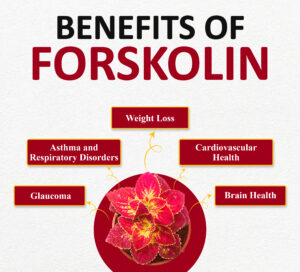Forskolin, a natural compound found in the roots of the Indian coleus plant (Coleus forskohlii), has been used in traditional medicine for centuries. In recent years, it has gained popularity as a dietary supplement, particularly for weight loss and bodybuilding. But does forskolin really work? This article delves into the uses, risks, and benefits of forskolin, backed by scientific research and expert opinions.
What is Forskolin?
Forskolin is an active compound extracted from the roots of the Coleus forskohlii plant, a member of the mint family. It has been traditionally used in Ayurvedic medicine to treat various health conditions, including heart disease, respiratory disorders, and digestive issues. Forskolin is believed to work by activating an enzyme called adenylate cyclase, which increases levels of cyclic AMP (cAMP) in cells. Elevated cAMP levels are associated with various physiological effects, including increased fat breakdown, improved insulin secretion, and enhanced blood flow.
Uses of Forskolin:

1. Weight Loss
One of the most popular uses of forskolin is for weight loss. Some studies suggest that forskolin can help reduce body fat and increase lean body mass.
A study published in Obesity Research examined the effects of forskolin on body composition and hormonal levels in overweight and obese men. Conducted by Michael P. Godard, Brad A. Johnson, and Scott R. Richmond, this randomized, double-blind, placebo-controlled study involved 30 men with a BMI of 26 kg/m² or higher, divided into forskolin and placebo groups.
The forskolin group showed significant decreases in body fat percentage and fat mass over 12 weeks (about 3 months), while lean body mass tended to increase. Forskolin also significantly increased serum free testosterone levels compared to the placebo. These findings suggest that forskolin may be effective in promoting favorable body composition changes and hormonal adaptations in overweight and obese men.
Also Read: Coconut Oil: Beneficial or Harmful?
2. Asthma and Respiratory Disorders
Forskolin has been traditionally used to treat asthma and other respiratory conditions. It is believed to work by relaxing the muscles around the bronchial tubes, making it easier to breathe. Some clinical trials have shown that forskolin can reduce the frequency and severity of asthma attacks.
Also Read: 6 Dispelling Myths and Embracing Facts of Curcuma Longa Extract
A study published in June 2019 in the Journal of Cellular Biochemistry looked at how extracts from the Coleus forskohlii plant (ECFK) help with asthma. Researchers used guinea pigs and rats to see how ECFK affects asthma symptoms. They found that ECFK made the asthma symptoms take longer to start, reduced the number of certain inflammatory cells in the lungs, and changed the levels of inflammation-related chemicals in the body.
Specifically, ECFK lowered harmful chemicals (IL-4, IL-5, IL-17) and increased beneficial ones (IFN-γ, IL-10). It also reduced markers of inflammation and tissue damage in the lungs. Overall, the study suggests that ECFK can help reduce inflammation and improve asthma symptoms, making it a promising treatment option.
3. Cardiovascular Health
Forskolin has been studied for its potential benefits on cardiovascular health. It is thought to improve heart function by increasing the force of heart contractions and promoting vasodilation (widening of blood vessels). Research suggests that forskolin can lower blood pressure and improve blood flow, making it a potential treatment for conditions like hypertension and congestive heart failure.
A study published in Journal of Cardiovascular Pharmacology in July 1990 compared the cardiovascular effects of forskolin with dobutamine and sodium nitroprusside in 12 patients with severe congestive cardiomyopathy.
Forskolin, derived from the Coleus forskohlii plant, showed significant benefits by reducing cardiac pre- and afterload, lowering pulmonary pressures, and increasing cardiac output and stroke volume by approximately 70%. Unlike dobutamine and nitroprusside, forskolin’s effects were achieved without dependence on beta 1-receptor stimulation, suggesting it could be advantageous for treating severe heart failure, particularly in patients unresponsive to catecholamines.
4. Glaucoma
Forskolin has been investigated as a treatment for glaucoma, a condition characterized by increased pressure in the eyes. Some studies suggest that forskolin can help reduce intraocular pressure, potentially preventing damage to the optic nerve and preserving vision.
A randomized controlled trial published in Journal of Ocular Pharmacology and Therapeutics in October 2012 examined the effects of oral forskolin and rutin on intraocular pressure (IOP) in primary open angle glaucoma (POAG) patients.
Conducted in eight glaucoma centers in Italy, the study involved 97 patients already on maximum tolerated medical therapy (MTMT) but still not achieving target IOP levels. The treatment group (52 patients) received a supplement containing forskolin and rutin, while the control group (45 patients) continued their usual therapy.
Results showed that the treatment group experienced a significant 10% reduction in IOP, starting from one week after beginning the supplement and lasting until surgery. This effect was more pronounced (15% reduction) in patients with initial IOP values of 21 mmHg or higher. In contrast, the control group’s IOP remained stable. The study concluded that oral forskolin and rutin can help further reduce IOP in POAG patients unresponsive to conventional treatments.
5. Brain Health
Forskolin, a natural compound derived from the Coleus forskohlii plant, offers notable benefits for brain health. It works by increasing levels of cyclic AMP (cAMP), a critical messenger in brain cells that enhances neural signaling, long-term memory, and cognitive function. Additionally, forskolin acts as a vasodilator, improving blood flow and oxygen delivery to the brain, which supports overall brain function. Research indicates that forskolin can boost mood, motivation, and memory, making it a promising supplement for enhancing cognitive health and combating age-related cognitive decline.
A study published in Journal of Neuropathology and Experimental Neurology in July 2016 investigated the effects of forskolin on memory loss and social behavior impairments in a mouse model of Alzheimer’s disease.
Forskolin, a compound from the Coleus forskohlii plant, was given to 5-month-old transgenic mice with amyloidosis, a condition similar to Alzheimer’s. The mice showed improved nest-building and sociability after 10 days of treatment. Additionally, forskolin reduced amyloid plaque deposits in the brain and decreased inflammation markers. These findings suggest that forskolin may have potential as a treatment for Alzheimer’s disease by protecting against behavioral deficits and reducing brain inflammation.
Risks and Side Effects
While forskolin is generally considered safe for most people when taken in appropriate doses, it can cause side effects in some individuals. Common side effects include:
Low Blood Pressure: Forskolin can lower blood pressure, which may cause dizziness or lightheadedness, especially in people with existing low blood pressure or those taking medications that lower blood pressure.
Increased Heart Rate: Some people may experience an increased heart rate or palpitations when taking forskolin, particularly at higher doses.
Gastrointestinal Issues: Forskolin can cause stomach discomfort, diarrhea, and nausea in some individuals.
Interactions with Medications: Forskolin can interact with certain medications, including blood thinners, antihypertensive drugs, and medications for asthma. It is important to consult a healthcare provider before taking forskolin, especially if you are on any medications or have underlying health conditions.
While some studies support its effectiveness, more research is needed to fully understand its mechanisms and long-term effects. As with any supplement, it is important to consult with a healthcare provider before starting forskolin, especially if you have underlying health conditions or are taking other medications. With proper guidance, forskolin may be a valuable addition to your health regimen, offering potential benefits backed by both traditional use and emerging scientific evidence.
References:
https://www.sciencedirect.com/topics/pharmacology-toxicology-and-pharmaceutical-science/forskolin
https://pubmed.ncbi.nlm.nih.gov/22731245/
https://pubmed.ncbi.nlm.nih.gov/1696672/
https://pubmed.ncbi.nlm.nih.gov/30520122/
https://nootropicsexpert.com/forskolin/
https://www.ncbi.nlm.nih.gov/pmc/articles/PMC4913438/
https://pubmed.ncbi.nlm.nih.gov/1696672/
https://www.mskcc.org/cancer-care/integrative-medicine/herbs/forskolin
Disclaimer: This statement has not been evaluated by the FDA. This product is not intended to diagnose, treat, cure, or prevent any disease. While the information provided is based on credible references, we do not make any specific claims or guarantees. It is important to consult with your healthcare advisor for personalized advice and guidance related to your health.





